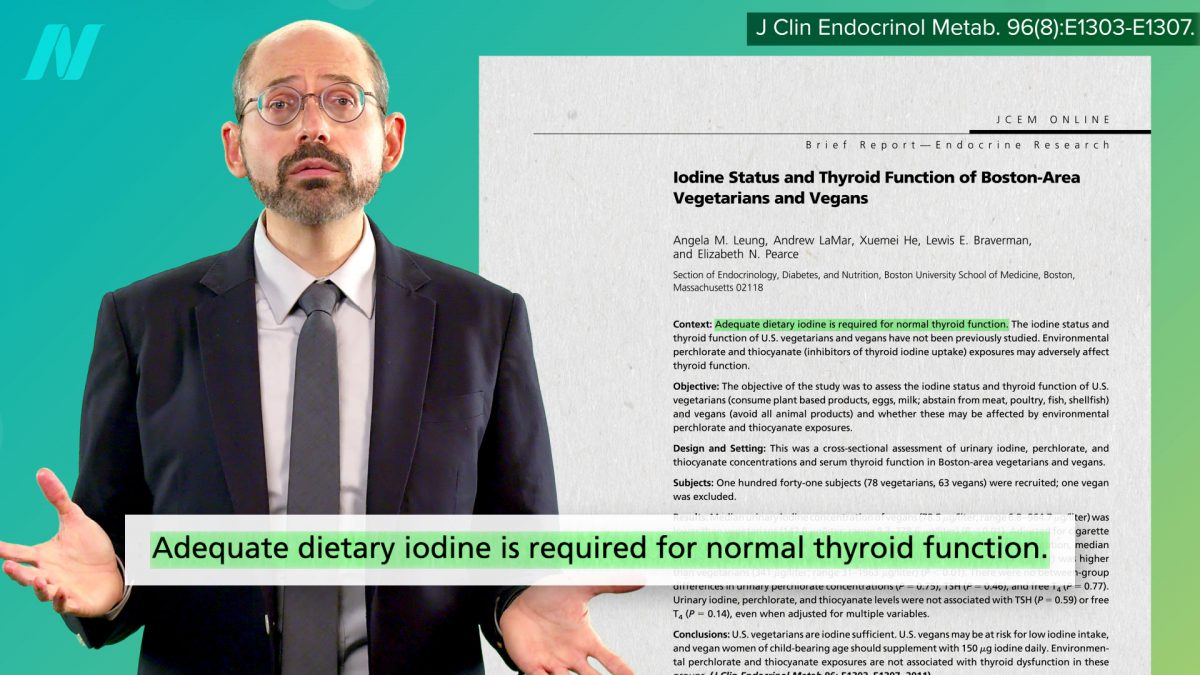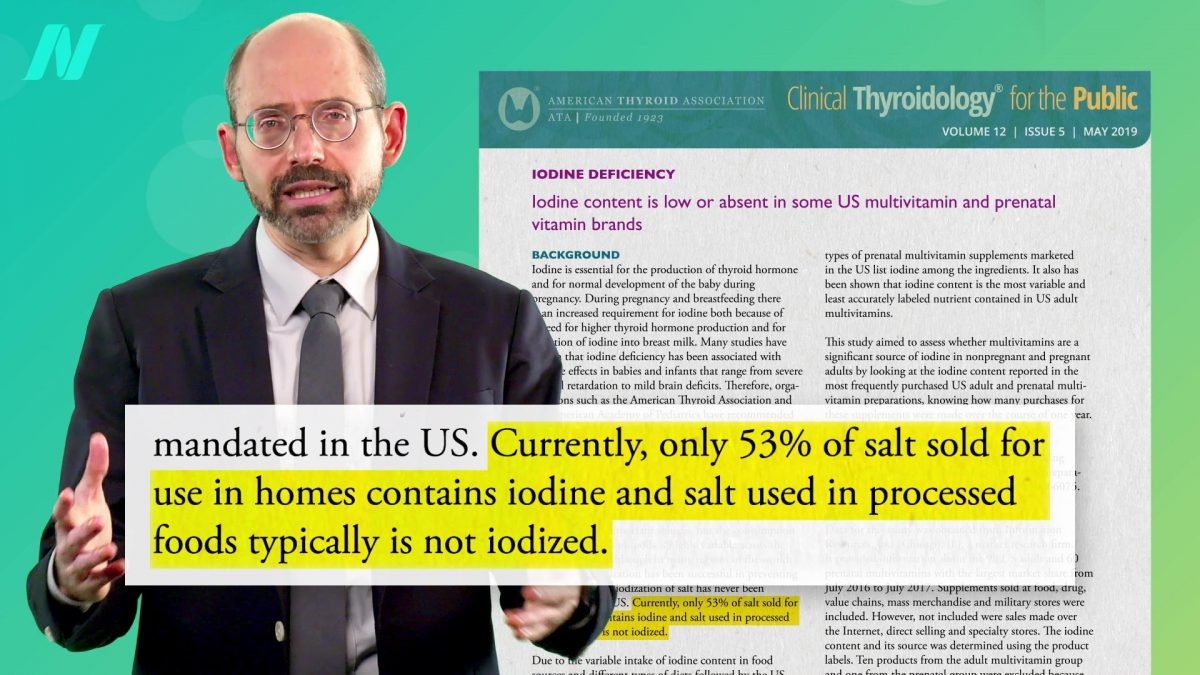
Thyroid Health
The mineral iodine, found predominantly in the ocean and in variable amounts in the soils of the world, is essential for thyroid function. To ensure everyone was getting enough, table salt was fortified with the mineral starting in the 1920s. Given that sodium is considered one of the leading dietary killers in the world, however, iodized salt should not be considered as a viable source (though if you do add salt to foods, use iodized salt instead of “sea salt” or other non-iodized varieties).
The Most Healthful Iodine Source
The most concentrated, healthful source is seaweed, which has the iodine of seafood without the fat-soluble pollutants that build up in the aquatic food chain. Sea vegetables are the underwater dark-green leafies, and I encourage you to experiment with ways to include them in your diet. The recommended daily intake of iodine is 150 mcg, which is what is in about two sheets of nori, the seaweed used to make sushi, or a half-teaspoon of the seaweeds arame or dulse. I caution against hijiki (also spelled hiziki), because it has been found to be contaminated with arsenic, as well as kelp, which may have too much iodine. (Just a half-teaspoon of kelp could exceed the daily upper limit.) Too much iodine can cause excessive thyroid gland activity.
Passing Over Pork Products
How else may we protect our thyroid health? One way is by minimizing exposure to pork products. Nearly 100,000 Americans are sickened each year by Yersinia bacteria. In every outbreak for which a source has been found, the culprit was contaminated pork. In most cases, Yersinia food poisoning leads to little more than acute gastroenteritis, but the symptoms can become severe and mirror appendicitis, resulting in unnecessary emergency surgeries. Long-term consequences of Yersinia infection include chronic inflammation of the eyes, kidneys, heart, and joints. Studies have found that within a year of contracting Yersinia food poisoning, victims appear 47 times more likely to come down with autoimmune arthritis, and the bacteria may also play a role in triggering an autoimmune thyroid condition known as Graves’ disease. How contaminated are U.S. pork products? Consumer Reports magazine tested nearly 200 samples from cities across the country and found that more than two-thirds of the pork was contaminated with Yersinia.
What About Soy Products?
Tofu, soy milk, miso, tempeh, edamame, and other soy products—including the soybeans themselves—are high in the same nutrients we associate with other legumes, such as fiber, iron, magnesium, potassium, protein, and zinc. Do they have any negative effects on thyroid function?
Soy Foods and Our Thyroid
Soy has so-called goitrogenic compounds (as do flaxseeds and vegetables in the broccoli family), and they can interfere with thyroid function in people with marginal iodine intake. The answer is not to avoid these super healthy foods, but to make sure you get enough iodine.
Soy and Thyroid Medication
Soy foods may inhibit the oral absorption of Synthroid, thyroid hormone replacement drugs, but so do all foods. That’s why we tell patients to take it on an empty stomach.
For substantiation of any statements of fact from the peer-reviewed medical literature, please see the associated videos below.
Image Credit: ChesiireCat / Thinkstock. This image has been modified.
Popular Videos for Thyroid Health


The Healthiest Natural Source of Iodine
How much nori, dulse, or arame approximate the recommended daily allowance for iodine?
The Best Diet for Hypothyroidism and Hyperthyroidism
Is the apparent protection of plant-based diets for thyroid health due to the exclusion of...
Diet for Hypothyroidism: A Natural Treatment for Hashimoto’s Disease
What were the results of a randomized, double-blind, placebo-controlled trial of a half teaspoon of...
Antibacterial Toothpaste: Harmful, Helpful, or Harmless?
Is triclosan in Colgate Total toothpaste safe in regards to the nitrate-reducing bacteria on our...
Seeing Red No. 3: Coloring to Dye For
The artificial food coloring Red No. 3 has yet to be banned—despite its purported role...All Videos for Thyroid Health
-

Potential Vitamin and Mineral Deficiency Risks on a Vegan Diet
What is the best way to get the nutrients of concern on a plant-based diet?
-

Diet for Hypothyroidism: A Natural Treatment for Hashimoto’s Disease
What were the results of a randomized, double-blind, placebo-controlled trial of a half teaspoon of powdered black cumin a day in Hashimoto’s (autoimmune thyroiditis) patients?
-

The Best Diet for Hypothyroidism and Hyperthyroidism
Is the apparent protection of plant-based diets for thyroid health due to the exclusion of animal foods, the benefits of plant foods, or both?
-

The Healthiest Natural Source of Iodine
How much nori, dulse, or arame approximate the recommended daily allowance for iodine?
-

Are Vegans at Risk for Iodine Deficiency?
Most plant-based milks are not fortified with iodine.
-

Is Fasting for Weight Loss Safe?
The reasons why fasting longer than 24 hours, and particularly three or more days, should only be done under the supervision of a health professional and preferably in a live-in clinic.
-

Is Aloe Vera Gel the Best Treatment for Lichen Planus?
We shouldn’t ever swallow aloe vera, but how does using it topically for a chronic inflammatory autoimmune disease compare to steroids?
-

Benefits of Marjoram for Polycystic Ovary Syndrome (PCOS)
Even a small amount of fresh herbs can double or even quadruple the antioxidant power of a meal. The abilities of oregano to decrease chromosomal damage from radiation and marjoram to affect hormone levels in women with PCOS are put to the test.
-

Iodine Supplements Before, During, and After Pregnancy
What is the evidence that all pregnant women should follow the American Thyroid Association’s recommendation to take a daily iodine supplement?
-

Fighting Lupus with Turmeric: Good as Gold
A quarter teaspoon of the spice turmeric was put to the test for the treatment of uncontrollable lupus (SLE) nephritis in a randomized, double-blind, placebo-controlled clinical trial.
-

Antibacterial Toothpaste: Harmful, Helpful, or Harmless?
Is triclosan in Colgate Total toothpaste safe in regards to the nitrate-reducing bacteria on our tongue and potential endocrine-disrupting effects on thyroid function and obesity?
-

Flame-Retardant Pollutants and Child Development
PBDE fire-retardant chemicals in the food supply may contribute to attention and cognitive deficits in children.
-

Alpha-Gal and the Lone Star Tick
Our immune response against a foreign molecule present in animal products may play a role in some allergic, autoimmune, and inflammatory disorders. This reaction is thought to underlie tick bite-triggered meat allergies.
-

Seeing Red No. 3: Coloring to Dye For
The artificial food coloring Red No. 3 has yet to be banned—despite its purported role in causing thousands of cases of thyroid cancer.
-

Alkylphenol Endocrine Disruptors and Allergies
The dramatic rise of allergic diseases such as eczema and seasonal allergies may be related to dietary exposure to endocrine-disruptor xenoestrogens, such as alkylphenol industrial pollutants.
-

Which Seaweed Is Most Protective Against Breast Cancer?
Nori seaweed snacks may favorably alter estrogen metabolism by modulating women’s gut flora, resulting in decreased breast cancer risk.
-

Do Dental X-Rays Cause Brain Tumors?
Getting bitewing or full mouth (panoramic) X-rays at the dentist may be associated with an increased risk of meningioma, the most common type of brain tumor.
-

Can Gargling Prevent the Common Cold?
Gargling, as commonly practiced in Japan, can not only soothe a sore throat, but may even prevent one.
-

Food Sources of Perfluorochemicals
Where do DDT, hexachlorobenzene, PCBs, and perfluorochemicals (linked to thyroid disease) concentrate in the food supply?
-

Poultry Exposure and Neurological Disease
Poultry workers exhibit an excess of a wide range of diseases, from thyroid conditions to schizophrenia, and autoimmune neurological disorders, such as myasthenia gravis. This may be due to exposure to viruses present in chickens and turkeys.
-

Bacon & Botulism
The nitrite preservatives in processed meats such as bologna, bacon, ham, and hot dogs form carcinogenic nitrosamines, but also reduce the growth of botulism bacteria—forcing regulators to strike a balance between consumers risking cancer, or a deadly form of food poisoning.
-

Too Much Iodine Can Be as Bad as Too Little
Excessive intake of kelp (kombu) or thyroid-containing sausages can lead to iodine toxicity.
-

Pregnant Vegans at Risk for Iodine Deficiency
Disinfectants used to sanitize cow udders may provide a source of iodine for dairy consumers, but can also increase the concentration of pus in milk from cows with staph infection mastitis.
-

Overdosing on Greens
Raw cruciferous vegetables: how much is too much?
-

The Problem with Organic Salmon
Much of our fish supply is so polluted that algae-derived sources of long-chain omega-3 fatty acids may be safest option.
